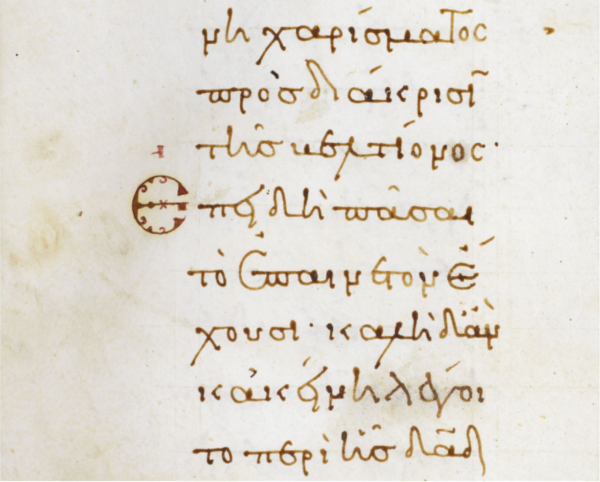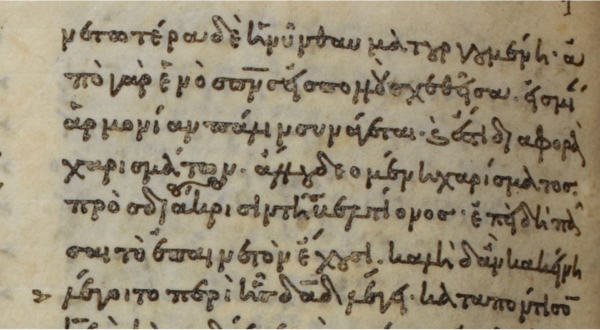Intro
Belgium has finally come and gone! Last week, I presented a paper at the conference, “Preaching After Easter” which was hosted by KU Leuven. My paper was concerned with the passage on which I’ve written here quite a bit: Gregory of Nazianzus’s Oration 41.15-16. By my own reckoning, my presentation went okay. My paper was quite technical, and I spoke too quickly (especially for non-native English speakers), but I was able to get some useful feedback from the audience. One objection was raised to my repunctuation of Or. 41.16. In this post, I try to explain my reasoning for my repunctuation, and address the questions that were raised (which help me improve the paper). The first part of the post will be rather accessible: that part of the argument doesn’t need to refer the Greek directly. I save the nitty, gritty details for the second part.
Gregory’s Argument
First, why repunctuate in the first place? As I’ve pondered this passage for many months, I’ve tried to puzzle out the progression of Gregory’s argument. As I’ve puzzled, I’ve determined that the passage needs to be repunctuated in three places to clarify Gregory’s reasoning and the structure of his argument. This post deals only with the final repunctuation, the other two I set aside for now. To show why the older punctuation is unsatisfactory, I offer an English translation, with the phrase in question bolded.
Yet this present, miraculous division of tongues is even more worthy of praise, because though it flows from one Spirit out to many people, it brings them once more into harmony, and because it is the type of gift that requires another gift to interpret this better [division of tongues], since all [gifts] have something praiseworthy. One may even call good that division about which David says, “Drown, O Lord, and scatter their tongues.”
The problem here comes from the reasoning of the passage. In the present punctuation scheme, how does “since all have something of worth” support the preceding argument? Gregory states that “the present division of tongues” (i.e. at Pentecost) is more worthy of praise than the division at Babel, and applauds the division of tongues at Pentecost because it brings harmony. Furthermore, he states, this division is the type of gift that requires another, which follows nicely from the prior statement about harmony. But would, “since all have something of praise” fit into this? The fact that all spiritual gifts have something praiseworthy is not relevant to Gregory’s argument, as he’s trying to demonstrate that Pentecost is superior to Babel.
Because of this difficulty of reasoning, I decided that we need to make “since all have something of worth” a proleptic causal clause, rather than a retrospective one. In plainer terms, the clause is part of the following sentence, and provides logical support for what follows it, rather than what comes before it. This results in a much clearer argument, as you can see below:
Yet this present, miraculous division of tongues is even more worthy of praise, because though it flows from one Spirit out to many people, it brings them once more into harmony, and because it is the type of gift that requires another gift to interpret this better [division of tongues]. Since all [divisions of tongues] have something praiseworthy, one may even call good that division about which David says, “Drown, O Lord, and scatter their tongues.”
The words in brackets have changed because we have to supply a different word in Greek after repunctuating the sentence (διαιρέσεις instead of διαφοραί). The logic here is much clearer. Gregory is making what some might consider an audacious claim: even David’s prayer to “scatter their tongues” is a worthy of praise. Since this claim needs support, he offers it by saying, “Since all divisions of tongues have something praiseworthy…” The bolded clause thus fits nicely into Gregory’s argument concerning “divisions of tongues.”
Nitty Gritty Details
Here’s the passage in Greek (with a bit extra added to catch the initial μέν), with my repunctuation:
Πλὴν ἐπαινετὴ μὲν καὶ ἡ παλαιὰ διαίρεσις τῶν φωνῶν, ἡνίκα τὸν πύργον ᾠκοδόμουν οἱ κακῶς καὶ ἀθέως ὁμοφωνοῦντες, (ὥσπερ καὶ τῶν νῦν τολμῶσί τινες)· τῇ γὰρ τῆς φωνῆς διαστάσει συνδιαλυθὲν τὸ ὀμόγνωμον, τὴν ἐγχείρησιν ἔλυσεν· ἀξιεπαινετωτέρα δὲ ἡ νῦν θαυματουργουμένη· ἀπὸ γὰρ ἑνὸς Πνεύματος εἰς πολλοὺς χεθεῖσα, εἰς μίαν ἁρμονίαν πάλιν συνάγεται· καὶ ἔστι διαφορὰ χαρισμάτων, ἄλλου δεομένη χαρίσματος πρὸς διάκρισιν τῆς βελτίονος. ἐπειδὴ πᾶσαι τὸ ἐπαινετὸν ἔχουσι, καλὴ δ᾽ἂν κἀκείνη λέγοιτο περὶ ἧς Δαβὶδ λέγει· « καταπόντισον, Κύριε, καὶ καταδίελε τὰς γλώσσας αὐτῶν ».
Without repunctuating, we would read, “… τῆς βελτίονος· ἐπειδὴ πᾶσαι τὸ ἐπαινετὸν ἔχουσι. καλὴ δ᾽ἂν κἀκείνη λέγοιτο περὶ ἧς Δαβὶδ λέγει …”
So, is this repunctuation valid? I think so, though it is possible to raise some objections. First, I should mention that I’m not the first to read the passage this way. At least two 10th century Greek manuscripts do: British Library Add Mss 14771 and 18231 both do too. Fortunately these manuscripts are online, and I can show pictures!
BL Add MS 14771 f. 94v, col. 1:

I note first the punctuation mark at the end of the third line. A dot at the top of the line, in this scheme, indicates a full stop (the equivalent of our period). At the beginning of the fourth line, we have an enlarged epsilon, indicating the start of a new paragraph. Finally, following χουσι in the sixth line, we have a punctuation mark in the middle of the line. It appears to veer a bit high (in practice, it’s hard to distinguish between medial dots and those at the top of the line), but notice that the iota does go higher. All of this shows that the phrase ἐπειδή πᾶσαι τὸ ἐπαινετὸν ἔχουσι is proleptic, and should be joined with what follows, as I’ve suggested.
The same can be seen in BL Add MS 18231, though this manuscript is a bit harder to read:

I note here that ἐπειδὴ πᾶσαι begins near the end of the fifth line, and just before it we have a mark at the top of the line, indicating a full stop. Then, following ἔχουσι in the middle of the sixth line, we have a mark on the baseline, which indicates a shorter pause, roughly equivalent to our comma. Again, this offers external support for my repunctuation.
On internal grounds, we can note that Gregory uses a passive, optative verb λέγοιτο, which indicates that he is making a potentially controversial claim (or, at least, that he is pretending to make a controversial claim). In English, the equivalent occurs when we say something like “one might say…” to distance oneself from the claim. The fact that Gregory is introducing a controversial claim means that it is quite logical for him to provide support with a causal clause.
As mentioned earlier, there are some potential difficulties with this construal (and they were pointed out during the Q&A after I presented this paper!). The problem is in the particles, specifically δέ (If there is ever a better case of “the devil is in the details,” please let me know!). Several of those listening to my paper pointed out the δέ is a connective particle, and thus can’t be used to coordinate with a subordinate clause. That is, in ἐπειδὴ πᾶσαι τὸ ἐπαινετὸν ἔχουσι, καλὴ δ᾽ἂν κἀκείνη λέγοιτο…, the δέ shouldn’t be allowed to refer back to the clause referred to by ἐπειδή.
There are, however, two potential responses. On one hand, we may note that certain “non-connective” uses of δέ do exist. Denniston, in his magisterial work on the Greek Particles, calls the primary non-connective use “apodotic δέ,” where δέ is used in the main clause following a previous subordinate clause. Admittedly, he does state, “only in Homer and Herodotus is apodotic δέ really at home.” TLG searches, though, have shown that it seems common enough in later writers. I’ve yet to find a clear instance in Gregory himself, but we do see it in younger contemporaries like Chrysostom[1] and Gregory of Nyssa[2].
It might be the case, then, that Gregory is using an δέ “apodotically” to refer back to the ἐπειδή clause. It’s also possible that the δέ refers back to the μέν at the beginning of the section. It’s common in Greek to have a single μέν followed by several δέ’s. Intuitively this makes sense to me, but I can’t find an appropriate category in Denniston to classify it. The “resumptive” seems to be appropriate, but I’m not certain enough to say for sure.
A similar question might be raised about the καί in κἀκείνη. This one’s a bit easier: I think we have an emphatic καί here, so that we understand it to mean something like “even.” Thus, I’ve translated, “one might even call good…”
Given the examples in other authors, I do think this repunctuation is justified. The use of δέ which results is not terribly common, but other writers demonstrate it’s possibility. Certainly, the argument makes much more sense when the ἐπειδή clause is read proleptically, as I’ve suggested. That several early manuscripts also support the reading gives an even further basis for the reading.
[1] Ἐπειδὴ δὲ Χριστὸς ὁ Θεὸς ἡμῶν θυσία προσηνέχθη, καὶ τὰ τῆς ἀναστάσεως προεχώρησε, περιῆρε δὲ τὰς προσηγορίας αὐτὰς ὁ φιλάνθρωπος Δεσπότης, καὶ καινὴν καὶ ξένην πολιτείαν εἰς τὸν βίον εἰσήγαγε τὸν ἡμέτερον· ἀντὶ γὰρ θανάτου λοιπὸν κοίμησις καὶ ὕπνος λέγεται ἡ ἐντεῦθεν μετάστασις. From Chrysostom’s Homily In Sanctum Pascha. PG 52.767.
[2] Ἐπειδὴ γὰρ Χριστὸς ἡ πέτρα παρὰ τοῦ Παύλου νενόηται, πᾶσα δὲ ἀγαθῶν ἐλπὶς ἐν τῷ Χριστῷ εἶναι πιστεύεται, ἐν ᾧ πάντας… From Gregory of Nyssa’s De Vita Mosis. Ch. 2 Section 248.
Ἐπειδὴ τοίνυν εἰς πατέρα καὶ υἱὸν καὶ πνεῦμα ἅγιον ἡ πίστις ἐστίν, ἀκολουθεῖ δὲ ἀλλήλοις ἡ πίστις ἡ δόξα τὸ βάπτισμα. From Gregory of Nyssa’s Epistulae. Ep. 24 Section 9.